Did you know that some of the foods you eat every day could be silently harming your prostate?
If you’re over 40, your risk of developing issues like BPH (Benign Prostatic Hyperplasia), frequent urination, or inflammation increases — and your diet plays a major role.
Certain foods can trigger hormone imbalances, inflammation, and even raise your risk of prostate cancer. That’s why understanding the Top Ten Worst Foods for Prostate Health isn’t just helpful — it’s essential.
In this article, you’ll discover the worst offenders hiding in your diet, what science says about them, and smart swaps that can help protect your prostate starting today.
👉 Whether you’re managing symptoms or thinking ahead, here’s what you need to know to take back control — one meal at a time.
🧠 Why Prostate Health Matters More Than Ever
Your prostate may be small, but it plays a big role in your overall health — especially as you age. This walnut-sized gland helps with everything from hormone production to reproductive function.
But here’s the thing: issues like BPH (benign enlargement), prostatitis (inflammation), and even prostate cancer are becoming increasingly common in men over 40.
⚠️ Did you know?
- Nearly 50% of men over 50 have BPH.
- Prostate cancer is the second most common cancer in men worldwide.
- Symptoms often start subtly — frequent urination, weak stream, or a feeling that you can’t fully empty your bladder.
And while some factors are out of your control (like age and genetics), your diet is one thing you can change — starting today.
Let’s now explore the top 10 foods that could be silently harming your prostate — and what to eat instead.
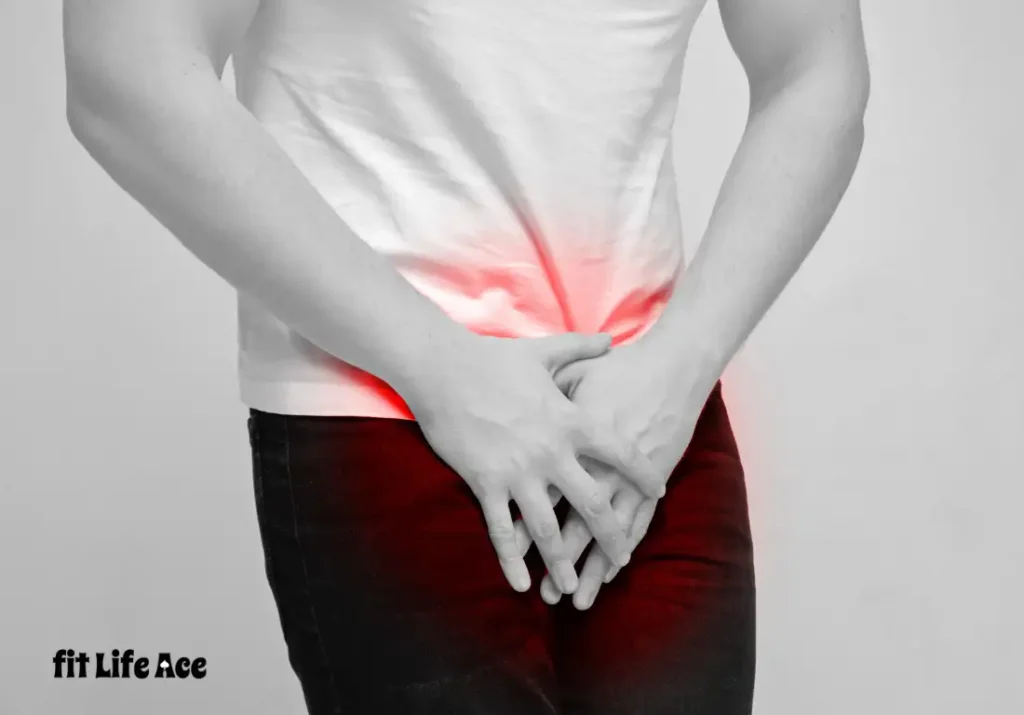
🛑 The 10 Worst Foods for Prostate Health
Each food will be covered in a mini-section with:
- 🔍 Why it’s harmful
- ⚠️ Supporting research (lightly referenced)
- ✅ Healthier alternatives
- 🔗 Internal link (where applicable)
🍖 1. Red Meat (Especially Processed Meat)
Red meat, especially when grilled or fried, contains compounds called heterocyclic amines (HCAs) and polycyclic aromatic hydrocarbons (PAHs) — both of which have been linked to an increased risk of prostate cancer.
In fact, the World Health Organization classifies processed meats (like bacon, sausages, and hot dogs) as carcinogenic to humans. Saturated fats in red meat also promote inflammation, which may worsen prostate issues.
- Plant-based proteins (beans, lentils)
- Lean poultry (grilled, not fried)
- Fatty fish like salmon (rich in omega-3s)
🔗 Want to reduce inflammation through diet?
👉 Explore Anti-Inflammatory Foods That Actually Help You Heal
🧀 2. High-Fat Dairy Products
Milk, cheese, and ice cream — especially the full-fat versions — are often loaded with saturated fats. Multiple studies (including The Journal of Nutrition) suggest a link between high dairy intake and increased risk of prostate cancer progression.
The likely culprits? Excess calcium and estrogen-like growth factors found in dairy may interfere with hormone regulation.
✅ Better Choices:
- Plant-based milks (almond, oat, soy)
- Low-fat or non-fat dairy (in moderation)
- Probiotic-rich yogurt (without added sugar)
🍔 3. Saturated Fats
Saturated fats — found in fried foods, baked goods, and fatty cuts of meat — may not only increase your heart disease risk, but also contribute to prostate inflammation and hormonal imbalances.
They can promote oxidative stress and reduce blood flow, impacting your prostate’s ability to function properly.
✅ Better Choices:
- Avocados, olive oil, and nuts
- Fatty fish (omega-3 rich)
- Flaxseeds and chia seeds
🍟 4. Fried Foods
French fries, fried chicken, onion rings — they may be crispy, but they’re also loaded with trans fats and advanced glycation end-products (AGEs), which have been linked to increased inflammation and cancer risk.
Fried foods are also often cooked in reused oils, adding even more oxidative stress to your system.
✅ Better Choices:
- Bake or air-fry instead of deep-frying
- Steam or grill your meals
- Snack on roasted chickpeas or kale chips
🔗 Trying to eat better on the go?
👉 The Ultimate Guide to Healthy Fast Food Options
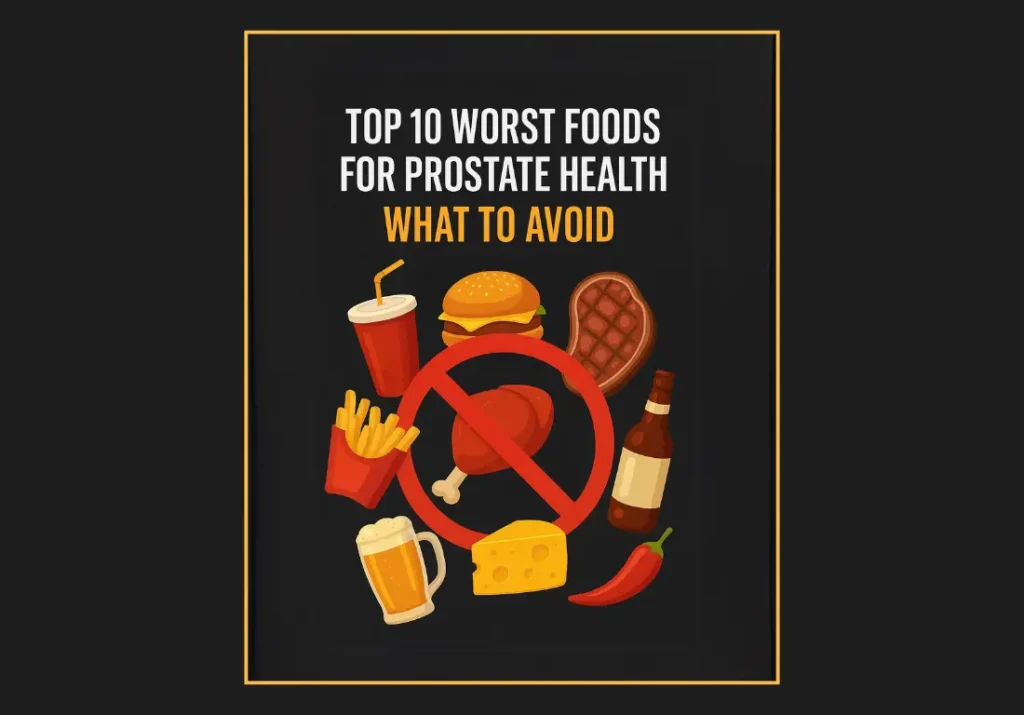
🍩 5. Sugary Foods and Beverages
High-sugar diets can cause blood sugar spikes, promote fat storage, and increase PSA levels — all of which negatively impact your prostate.
Increased sugar intake is also associated with metabolic syndrome, a known contributor to BPH symptoms and chronic inflammation.
✅ Better Choices:
- Fresh fruits (berries, apples, citrus)
- Naturally sweetened snacks (dates, dark chocolate)
- Sparkling water with lime instead of soda
🔗 Want a guilt-free way to handle sweet cravings?
👉 How to Curb Cravings: Guilt-Free Gluten-Free Snacks You’ll Love
🍺 6. Excessive Alcohol
While a glass of red wine may offer some benefits, heavy alcohol use is linked to a higher risk of aggressive prostate cancer.
Alcohol also disrupts liver function, impacts hormone levels (especially testosterone), and increases inflammation.
✅ Better Choices:
- Limit to 1 drink/day or switch to alcohol-free alternatives
- Choose herbal teas or infused water
- Try mocktails with fresh citrus and mint
☕ 7. High Caffeine Intake
Caffeine acts as a diuretic — meaning it increases urination. For men with BPH, this can worsen symptoms like urinary urgency, frequency, and nighttime trips to the bathroom.
Caffeine may also irritate the bladder lining, contributing to discomfort and inflammation.
✅ Better Choices:
- Switch to decaf or herbal teas (like chamomile or rooibos)
- Reduce coffee to 1 cup/day
- Avoid caffeine after 4pm
🌭 8. Processed Meats
Hot dogs, salami, deli meats — these are loaded with preservatives, nitrates, and sodium. The World Cancer Research Fund strongly advises against eating these regularly.
These meats have been shown to increase inflammation markers, which may accelerate prostate enlargement and cancer progression.
✅ Better Choices:
- Grilled chicken or turkey
- Homemade lean meatballs
- Plant-based sausages (read the label)
🧂 9. High-Sodium Foods
Excess salt in processed and packaged foods contributes to fluid retention, worsens blood pressure, and may amplify urinary urgency — especially in men with BPH.
Many canned soups, snacks, and frozen meals contain 3–4 times the recommended sodium per serving.
✅ Better Choices:
- Cook with herbs and spices instead of salt
- Rinse canned beans and veggies before using
- Look for “low-sodium” or “no added salt” labels
🌶️ 10. Spicy Foods
Spicy meals can be satisfying, but they can also irritate the urinary tract and cause bladder spasms — especially if you’re already dealing with prostate enlargement.
While not inherently bad, excessive consumption of spicy foods can trigger inflammation and discomfort in sensitive individuals.
✅ Better Choices:
- Use turmeric, ginger, or cinnamon for flavor
- Eat spicy meals earlier in the day
- Practice moderation if symptoms flare
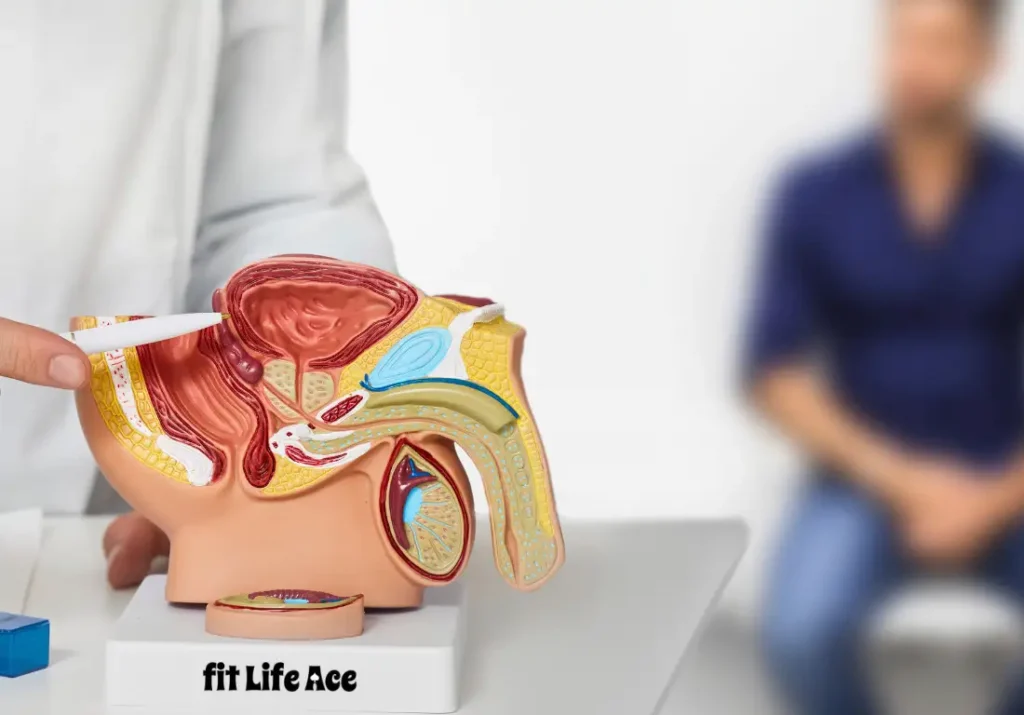
🥗 Foods That Help – The Healthier Swaps
While knowing what to avoid is powerful, knowing what to replace it with is even more important.
Here are some foods that are not only safe but beneficial for your prostate health — backed by science and commonly recommended by urologists and nutritionists alike.
🍅 1. Tomatoes (Rich in Lycopene)
Tomatoes contain lycopene, a powerful antioxidant that has been linked to reduced prostate cancer risk. Cooked tomatoes (like in sauce or paste) actually enhance lycopene absorption.
✅ Add this:
- Tomato sauce over whole grain pasta
- Fresh salsa or tomato soup
🥦 2. Cruciferous Vegetables
Broccoli, kale, cauliflower, and Brussels sprouts support liver detox and lower inflammation — both of which are key for prostate health. These veggies also contain sulforaphane, which may protect against cancer cell growth.
✅ Add this:
- Steamed broccoli as a side
- Kale in smoothies or stir-fries
🐟 3. Fatty Fish (Omega-3s)
Salmon, sardines, and mackerel provide omega-3 fatty acids that combat inflammation and may slow the progression of prostate enlargement.
✅ Add this:
- Baked salmon twice a week
- Tuna salad (light mayo) on whole grain bread
🥜 4. Nuts & Seeds (Zinc-Rich)
Zinc is vital for prostate function. Pumpkin seeds, sunflower seeds, and walnuts provide healthy fats, antioxidants, and essential trace minerals.
✅ Add this:
- Pumpkin seeds as a snack
- Nut butters (no added sugar) on toast
🫘 5. Legumes & Soy
Beans, lentils, and soy products like tofu and tempeh contain phytoestrogens that may balance hormone levels and reduce BPH risk.
✅ Add this:
- Bean soups, lentil stews
- Grilled tofu in salads or wraps
🔗 Pair these superfoods with calming habits
👉 Somatic Yoga for Beginners: Reconnect with Your Body and Find Relief
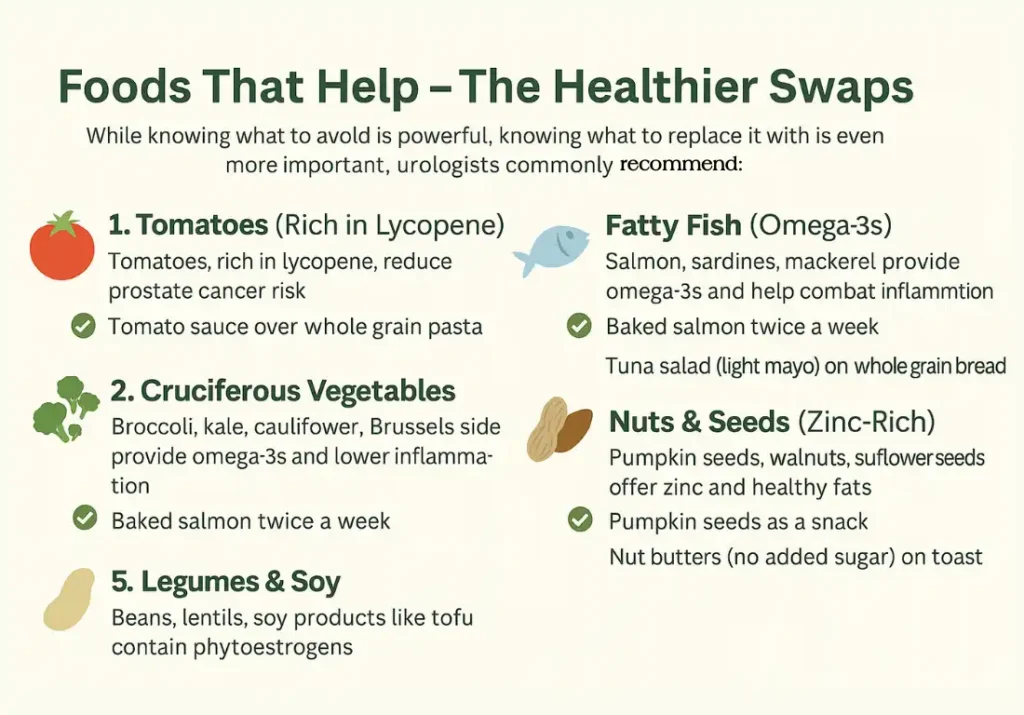
Once you know the ten worst foods for prostate health, it’s easier to make smart choices like including tomatoes, cruciferous veggies, and omega-3-rich fish.
🧴 Why I Recommend Prostavive for Prostate Support
When it comes to supporting your prostate health naturally, diet is a huge factor — but it’s not the only one. Sometimes, even with the best food choices, you still deal with urinary issues, discomfort, or just want extra support.
That’s where Prostavive can make a real difference. Pairing a clean diet free of the ten worst foods for prostate health with a supplement like Prostavive may offer the most comprehensive support.
🌿 How Prostavive Works – Backed by Nature
Prostavive is a plant-based supplement specifically designed to promote healthy prostate function, reduce inflammation, and support better urinary flow. It combines clinically backed ingredients like:
- Saw Palmetto Extract: Known to ease BPH symptoms and reduce nighttime urination
- Pumpkin Seed Oil: Rich in zinc and phytosterols that support hormone balance
- Stinging Nettle Root: May reduce prostate inflammation and support urine flow
- Beta-Sitosterol: Helps improve urinary symptoms and reduce PSA levels
- Zinc & Selenium: Essential minerals for prostate tissue health and antioxidant protection
These ingredients are not only well-researched but also non-GMO, vegan-friendly, and stimulant-free.
👨⚕️ Who It’s For
Prostavive is a great fit if you:
- Are experiencing early signs of BPH or enlarged prostate
- Wake up multiple times a night to urinate
- Feel like you can’t fully empty your bladder
- Want to avoid harsh medications with side effects
- Are looking for a natural way to support long-term prostate wellness
📈 Real Results and Positive Reviews
Many users report:
- Fewer nighttime bathroom trips
- Improved urinary flow
- Less discomfort and pressure
- Better sleep and daily comfort
✅ “I’ve tried multiple prostate supplements — Prostavive is the first one that actually worked without making me feel jittery.”
— Mark R., 58
👉 Take the Next Step Toward a Healthier Prostate
If you’re working to cut out prostate-damaging foods and eat healthier, Prostavive is the perfect companion to your efforts. Think of it as daily reinforcement for your long-term wellness.
🔗 → Click here to learn more about Prostavive and see if it’s right for you.
⚠️ This post contains affiliate links. If you purchase through one of these links, I may earn a small commission at no extra cost to you — which helps me keep creating helpful content like this.
🏃 Lifestyle Changes That Make a Real Difference
Along with avoiding the ten worst foods for prostate health, daily exercise and hydration play a major role.
While diet and supplements like Prostavive are key players, prostate health thrives with a whole-body approach. Small, consistent lifestyle changes can reduce symptoms, slow progression, and improve your quality of life.
🧘♂️ 1. Stay Active
Regular exercise boosts circulation, reduces inflammation, and helps maintain a healthy weight — all important for prostate function.
✅ Aim for:
- 30 minutes of walking, swimming, or light cardio
- Stretch-focused routines like yoga or tai chi
🥤 2. Hydrate Smartly
Drinking enough water is crucial — but avoid chugging late at night, which can worsen nighttime urination.
✅ Tip:
- Drink most of your fluids before 6 PM
- Limit caffeine and alcohol intake
🧠 3. Manage Stress
Chronic stress can impact hormone levels and worsen urinary symptoms.
✅ Try:
- Deep breathing exercises
- Nature walks
- Meditation apps or guided routines
🚭 4. Avoid Smoking
Smoking increases inflammation and may contribute to more aggressive prostate conditions.
⚖️ 5. Maintain a Healthy Weight
Being overweight increases the risk of BPH and other metabolic conditions that put pressure on your urinary system.
✅ Eat mindfully, stay active, and focus on anti-inflammatory foods.
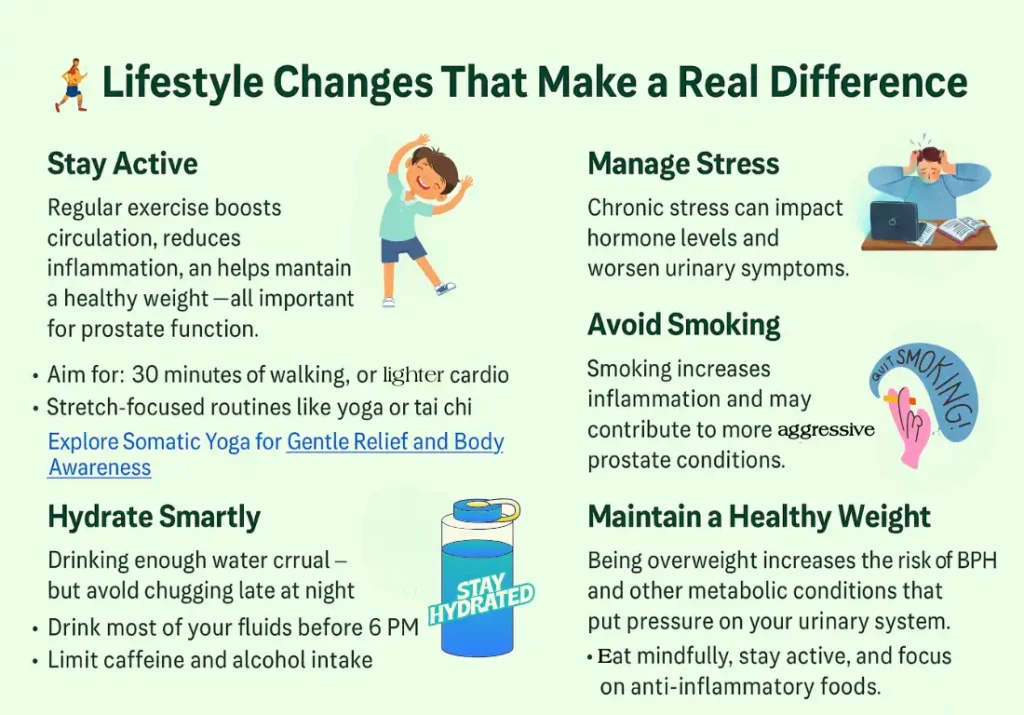
✅ Final Thoughts – Ten Worst Foods for Prostate Health
By avoiding these ten worst foods for prostate health, embracing smarter food choices, and adding natural support like Prostavive, you’re creating a proactive, long-term wellness plan.
🚀 Ready to take charge of your health?
Start with your next meal — and if you’re looking for that extra support, click here to explore how Prostavive can help.
Your prostate health is in your hands. Start today — your future self will be glad you did.
❓ FAQs
Can spicy foods really irritate my prostate?
Yes — spicy foods can irritate the urinary tract, especially if you have BPH. If your symptoms flare after eating spicy meals, it’s a good idea to cut back and monitor how your body responds.
Is red meat always bad for prostate health?
Red meat in moderation may not be harmful, but frequent consumption of grilled or processed red meat is linked to higher prostate cancer risk. Switching to lean proteins or plant-based options can support prostate health.
Are eggs bad for an enlarged prostate?
Eggs aren’t harmful for most men, but excessive intake of animal fats and cholesterol may worsen BPH symptoms. Limit eggs to 2–4 per week and pair with more vegetables and healthy fats.
What is the best drink to shrink prostate?
Green tea is rich in antioxidants that may reduce inflammation and support prostate function. Pomegranate juice and nettle tea are also helpful, while sugary drinks and excess caffeine should be limited.
What three nuts can shrink a swollen prostate?
Pumpkin seeds, Brazil nuts, and walnuts are excellent for prostate health. They offer zinc, selenium, and anti-inflammatory omega-3s that may help reduce BPH symptoms.
What foods should I avoid for better urinary flow?
Avoid red meat, fried foods, processed snacks, caffeine, and alcohol — all can worsen urinary urgency or frequency. Eating whole foods and staying hydrated helps support smoother flow.
How does salt affect prostate or bladder health?
High sodium intake can worsen urinary symptoms by increasing fluid retention and bladder irritation. Reduce added salt and processed foods to ease BPH-related discomfort.
How do dietary fats affect prostate health?
Diets high in saturated fats and omega-6 oils may increase prostate cancer risk. Healthier fats like omega-3s from fish can support prostate cell health and reduce inflammation.
Does dairy increase prostate cancer risk?
Some studies link high dairy consumption with increased risk of prostate cancer, possibly due to calcium or hormone content. Consider reducing high-fat milk, cheese, and ice cream intake.
How does sugar affect prostate inflammation?
High intake of refined sugar and sugary drinks may raise inflammation and PSA levels. Choose natural carbs and whole fruits over soda or desserts with added sugars.
Should I stop drinking coffee for prostate health?
If you experience urgency or nighttime urination, reducing coffee might help. Caffeine can act as a bladder irritant for men with BPH, especially in large amounts.
Are artificial sweeteners better than sugar?
Not always. Some artificial sweeteners can still irritate the bladder or disrupt digestion. Natural alternatives like stevia or fruit-based sweetness are gentler on your system.
Why is there so much conflicting prostate diet advice?
Many diets like keto, vegan, and Mediterranean claim prostate benefits, but results vary by person. Focus on cutting inflammatory foods and tracking what works for your body — there’s no one-size-fits-all fix.
Can I still enjoy my favorite foods without harming my prostate?
Yes — moderation is key. Even foods like red meat or alcohol can be enjoyed occasionally if your base diet supports prostate health with plants, fiber, and healthy fats.
Is a plant-based diet the only option for prostate support?
Plant-forward diets are helpful, but not the only solution. Including lean fish, nuts, seeds, and natural supplements can also support prostate health without being strictly vegan or vegetarian.
Do cooking methods really affect prostate health?
Yes. Grilling or frying meat at high temperatures creates compounds like HCAs and PAHs, which have been linked to prostate cancer. Baking or steaming is a safer choice.
Do prostate supplements like Prostavive actually work?
Some men report relief from BPH symptoms using supplements with saw palmetto, pumpkin seed oil, or zinc. Results vary, but natural support can be part of a healthy routine when combined with diet and exercise.

